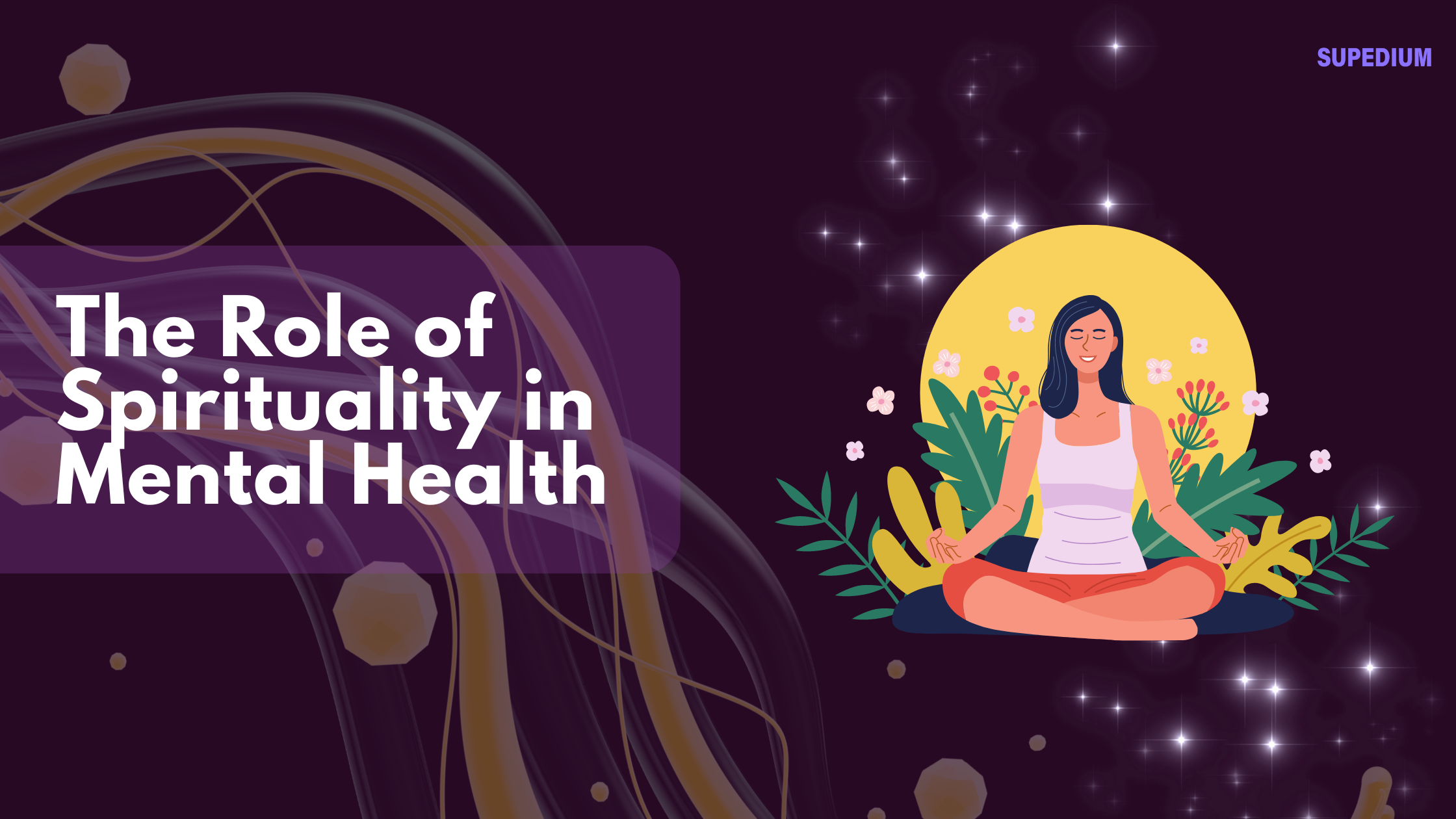Table of Contents
![]()
Introduction
Spirituality, often defined as a personal connection to something greater than oneself, encompasses a broad range of beliefs and practices that are not necessarily tied to organized religion. It includes secular approaches as well as religious ones, focusing on an individual’s sense of purpose, meaning, and connection. Mental health, on the other hand, refers to emotional, psychological, and social well-being, influencing how individuals think, feel, and act. This article explores the intricate relationship between spirituality and mental health, examining both the positive impacts and the potential challenges that arise.
Theoretical Framework
Historical Perspectives
Historically, spirituality and mental health were often intertwined in various cultures, where spiritual practices were integral to healing and well-being. Ancient traditions such as meditation and prayer were commonly used to address emotional and psychological issues. In modern psychology, there has been a shift towards understanding these practices through empirical research, exploring how they influence mental health and well-being.
Definitions and Concepts
It is crucial to distinguish between spirituality and religion. While religion often involves structured practices, doctrines, and community affiliations, spirituality is more personal and individualized. Spirituality can be seen as a holistic approach that integrates the emotional, cognitive, and social dimensions of an individual, as opposed to a reductionist view that isolates mental health from broader life experiences.
Positive Impacts of Spirituality on Mental Health
Psychological Benefits
One of the significant ways spirituality benefits mental health is through stress reduction. Spiritual practices such as meditation, prayer, and mindfulness have been shown to activate the body’s relaxation response, reducing the levels of stress hormones and promoting a sense of calm. Research has demonstrated that individuals who engage in regular spiritual practices often report lower levels of stress and anxiety. For example, a study published in the Journal of Clinical Psychology found that mindfulness meditation led to significant reductions in stress and improvements in overall well-being.
Enhanced Resilience
Spirituality can also enhance resilience, helping individuals cope better with life’s challenges. Spiritual beliefs often provide a framework for understanding and managing adversity, offering coping strategies and a support system. Case studies have shown that individuals who draw strength from their spiritual beliefs are more likely to recover from traumatic experiences and maintain psychological stability.
Emotional Benefits
Increased Sense of Purpose and Meaning
A profound sense of purpose and meaning is another emotional benefit of spirituality. Individuals who engage in spiritual practices often report a greater sense of fulfillment and life satisfaction. Spiritual beliefs can provide direction and motivation, aligning personal goals with a broader, transcendent purpose. This sense of purpose has been linked to improved mental health outcomes, including reduced rates of depression and anxiety.
Improved Emotional Regulation
Spirituality also contributes to better emotional regulation. Practices such as self-reflection and mindfulness can help individuals manage their emotions more effectively. For instance, spiritual practices that encourage introspection and self-awareness can lead to improved mood and reduced anxiety. Studies have found that spiritual practices can help individuals develop greater emotional resilience and a more balanced emotional state.
Social Benefits
Community and Support Networks
Spiritual communities play a crucial role in providing social support. Being part of a spiritual or religious group can reduce feelings of loneliness and social isolation. These communities offer a sense of belonging and connection, which are essential for mental well-being. Research indicates that individuals who are actively involved in spiritual communities often report higher levels of social support and improved mental health.
Encouragement of Altruism and Compassion
Spirituality frequently encourages altruism and compassion, which positively affect interpersonal relationships and mental health. Spiritual teachings often emphasize kindness, empathy, and service to others. Engaging in acts of compassion and altruism has been shown to enhance one’s own sense of well-being and create a positive social environment.
Negative Aspects and Challenges
Potential for Spiritual Bypassing
While spirituality has many benefits, it can also lead to spiritual bypassing, where individuals use spiritual practices to avoid addressing underlying psychological issues. Spiritual bypassing involves using spiritual beliefs or practices to sidestep or dismiss emotional problems rather than addressing them directly. This can hinder genuine psychological healing and growth.
Conflicts with Professional Mental Health Practices
There can be conflicts between spiritual beliefs and conventional mental health practices. Some individuals may find that their spiritual beliefs clash with psychological approaches or therapeutic techniques. Integrating spirituality with mental health care requires careful consideration to ensure that both perspectives are respected and effectively combined.
Risk of Negative Spiritual Experiences
Negative spiritual experiences, such as spiritual crises or encounters with toxic spiritual environments, can adversely affect mental health. Spiritual crises, often referred to as “dark nights of the soul,” can be distressing and lead to emotional turmoil. It is essential to address these issues with appropriate support to prevent negative impacts on mental health.
Case Studies and Research Evidence
Empirical Studies on Spirituality and Mental Health
Numerous empirical studies have explored the relationship between spirituality and mental health. Quantitative research has found that spiritual practices such as meditation and prayer are associated with reduced levels of stress and improved mental health. Qualitative research has provided insights into how individuals perceive and experience the benefits of spirituality in their lives.
Personal Anecdotes and Case Studies
Personal anecdotes and case studies further illustrate the impact of spirituality on mental health. Testimonials from individuals who have experienced positive changes through spiritual practices provide valuable insights into the practical benefits of spirituality. Conversely, accounts of individuals who have faced challenges highlight the need for a balanced approach to integrating spirituality and mental health.
Integration of Spirituality in Mental Health Practices
Complementary Approaches
Integrating spirituality with conventional mental health practices can offer a more holistic approach to treatment. Complementary therapies that incorporate spiritual elements, such as mindfulness-based cognitive therapy, have shown promising results. These approaches can address both the psychological and spiritual aspects of mental health.
Role of Mental Health Professionals
Mental health professionals play a crucial role in understanding and respecting clients’ spiritual beliefs. Training and awareness in addressing spirituality can enhance therapeutic practices and ensure that clients receive comprehensive care. Ethical considerations include respecting clients’ beliefs while integrating appropriate psychological techniques.
Practical Recommendations
For Individuals
Individuals can explore and incorporate personal spiritual practices to support their mental health. Engaging in practices such as meditation, prayer, or reflective journaling can enhance well-being. Seeking support from both spiritual and mental health professionals can provide a well-rounded approach to addressing mental health concerns.
For Mental Health Professionals
Mental health professionals should develop skills to understand and respect clients’ spiritual beliefs. Integrating spiritual perspectives when appropriate can enhance the effectiveness of therapy. Professionals should also be aware of ethical considerations and strive to provide balanced and respectful care.
Conclusion
Spirituality can play a significant role in mental health, offering both benefits and challenges. While spiritual practices can provide stress reduction, emotional regulation, and social support, they can also present challenges such as spiritual bypassing and conflicts with conventional therapies. A balanced approach that integrates spirituality with mental health practices can offer a comprehensive path to well-being. Continued research and thoughtful integration of spiritual perspectives into mental health care can further enhance our understanding of this complex relationship.
Share This





Be the first to comment